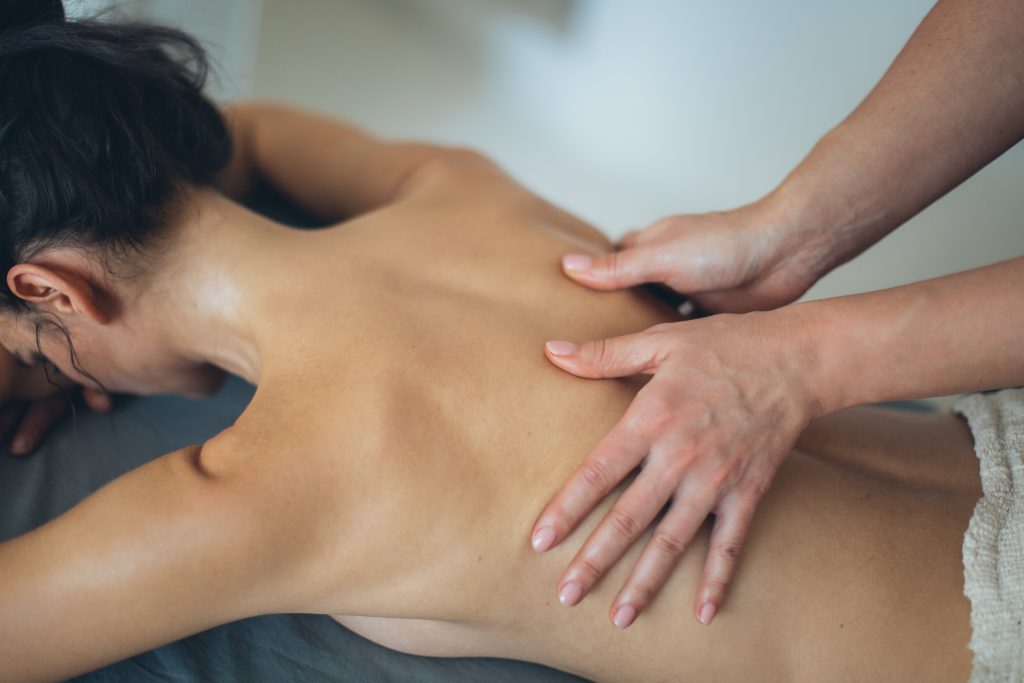Discover the importance of taking precautions when getting a postpartum massage.
Taking Precautions When Getting a Postpartum Massage

Congratulations on welcoming your little bundle of joy into the world! As a new mom, you’ve undoubtedly undergone incredible changes – both physical and emotional – during pregnancy and childbirth. Now that you’re navigating the exciting world of postpartum recovery, it’s essential to prioritize self-care. One wonderful way to do this is through postpartum massage. However, before you dive headfirst into this blissful experience, let’s explore some precautions you should consider.
Understanding the Importance of Postpartum Massage
Postpartum massage is not just a luxurious treat; it’s an integral part of your recovery journey. The physical discomfort and emotional challenges that often accompany childbirth can tremendously benefit from the healing touch of massage therapy. By addressing your unique postnatal needs, a skilled massage therapist can help ease muscle tension, promote relaxation, reduce stress, and facilitate your body’s natural healing process.
The Role of Massage in Postpartum Recovery
During pregnancy, your body undergoes remarkable changes to accommodate the growth of your little one. The weight gain, hormonal fluctuations, and increased blood volume can take a toll on your body. After giving birth, your body needs time to readjust and heal. Postpartum massage plays a vital role in facilitating this process by stimulating circulation, improving lymphatic drainage, and promoting the release of tension in specific areas, such as the lower back, hips, and shoulders.
When you receive a postpartum massage, the therapist will use techniques that are specifically tailored to your needs. They will focus on areas that have been strained during pregnancy and childbirth, such as the pelvic floor muscles and the abdominal area. By addressing these areas, massage therapy can help restore muscle tone and improve overall mobility.
In addition to physical benefits, postpartum massage also provides emotional support during this transitional period. The nurturing touch of a skilled therapist can help you feel grounded and connected to your body, promoting a sense of well-being and self-care.
Health Benefits of Postpartum Massage
In addition to its role in postpartum recovery, massage offers a myriad of health benefits for new moms. It can help alleviate common postpartum concerns such as sore breasts, swelling, constipation, and even postnatal depression.
Massage therapy can help relieve breast engorgement and improve milk flow. The therapist will use gentle techniques to stimulate lymphatic drainage and reduce swelling in the breasts. This can provide much-needed relief for breastfeeding moms and help prevent complications such as mastitis.
Postpartum massage can also aid in relieving constipation, a common issue after childbirth. The therapist will use specific techniques to stimulate the digestive system and promote regular bowel movements. This can help alleviate discomfort and restore normal bowel function.
One of the most significant benefits of postpartum massage is its impact on mental well-being. The hormonal changes that occur after childbirth can lead to mood swings, anxiety, and postnatal depression. Massage therapy can help combat these symptoms by boosting serotonin and endorphin levels, which are known as the “feel-good” hormones. This can uplift your mood, improve sleep quality, and enhance your overall mental well-being.
Furthermore, postpartum massage provides a magical opportunity for you to unwind and reconnect with yourself amidst the demands of caring for your little one. The tranquil environment, soothing music, and therapeutic touch can create a sense of relaxation and rejuvenation. It allows you to take a break from the responsibilities of motherhood and prioritize self-care, which is essential for your overall well-being.
Identifying the Right Time for a Postpartum Massage
Timing is everything when it comes to postpartum massage. While indulging in a soothing massage session may seem enticing, it’s crucial to ensure you’re physically and emotionally ready.
After the beautiful and transformative experience of childbirth, your body needs time to heal and recover. It’s a time of adjustment, both physically and emotionally. Postpartum massage can be a wonderful way to support your body’s healing process and provide much-needed relaxation. However, it’s important to assess your physical readiness and consider your emotional well-being before booking a massage.
Assessing Your Physical Readiness
Before booking your massage, consult with your healthcare provider to determine if you’ve sufficiently healed from childbirth. Generally, it’s recommended to wait for at least six weeks postpartum. This allows your body time to recover and any potential incisions or tears to heal. Your healthcare provider will assess your individual situation and provide guidance based on your unique circumstances.
During the first few weeks after childbirth, your body undergoes significant changes. The uterus shrinks back to its pre-pregnancy size, and your pelvic floor muscles start to regain strength. Your body may still be adjusting to breastfeeding, sleep deprivation, and hormonal changes. It’s important to give yourself time to adapt to these changes before introducing additional physical stress, such as a massage.
Remember, every individual is unique, so listen to your body’s cues and seek medical advice if you have any concerns. Your healthcare provider will be able to evaluate your specific situation and provide personalized recommendations.
Considering Your Emotional Well-being
Postpartum emotions can fluctuate, and it’s essential to be attentive to your emotional well-being. The postpartum period is a time of immense joy, but it can also bring about feelings of sadness, anxiety, and overwhelm. If you’re experiencing postnatal depression, anxiety, or any other mood disorders, it’s important to discuss them with your healthcare provider before scheduling your massage.
Your healthcare provider can provide valuable insights and recommend therapies that will help support your mental health journey. They may suggest additional resources, such as counseling or support groups, to address any emotional challenges you may be facing. Taking care of your emotional well-being is just as important as taking care of your physical health during the postpartum period.
Remember, there is no shame in seeking help or support. Many new parents experience a wide range of emotions after childbirth, and reaching out for assistance is a sign of strength and self-care.
In conclusion, while postpartum massage can be a beneficial and enjoyable experience, it’s important to prioritize your physical and emotional well-being. Consult with your healthcare provider to determine the right time for a massage, ensuring that your body has had sufficient time to heal and that your emotional well-being is being supported. By taking these steps, you can make the most of your postpartum massage experience and promote your overall wellness during this special time in your life.
Choosing a Qualified Postpartum Massage Therapist
When it comes to entrusting your body and well-being to a massage therapist, it’s vital to choose someone qualified and experienced in postpartum massage.
Postpartum massage is a specialized form of massage therapy that focuses on the unique needs and considerations of new moms. It can help alleviate postpartum discomfort, reduce stress, promote relaxation, and aid in the recovery process. However, not all massage therapists are trained in this specific area, so it’s important to do your research and find a therapist who has the necessary certifications and expertise.
Necessary Certifications and Training
Ensure that the therapist you select has received specialized training in postpartum massage techniques. They should possess the necessary certifications and be knowledgeable about the unique needs and considerations for new moms. This expertise will ensure they can tailor the massage to address your specific concerns and deliver an optimal experience.
A qualified postpartum massage therapist should be familiar with the physiological changes that occur during pregnancy and childbirth. They should understand the impact of hormonal fluctuations, muscle tension, and postural changes on a new mother’s body. This knowledge will enable them to provide targeted massage techniques that promote healing, relaxation, and overall well-being.
Additionally, it’s important for the therapist to have a thorough understanding of any potential complications that may arise during the postpartum period. They should be able to identify contraindications and adapt their massage techniques accordingly. This level of expertise will ensure that you receive a safe and effective massage that supports your postpartum recovery.
Questions to Ask Your Potential Therapist
Don’t be afraid to ask questions before making your decision. Inquire about the therapist’s experience with postpartum clients, their approach to addressing common postpartum concerns, and any additional certifications or qualifications they hold. This information will help you feel confident in your choice and establish a trusting relationship with your therapist.
Some questions you may want to consider asking include:
- How many years of experience do you have in providing postpartum massage?
- What techniques do you use to address common postpartum concerns such as back pain, muscle tension, and breastfeeding-related discomfort?
- Have you received any additional certifications or training in postpartum massage?
- Do you have any testimonials or references from previous postpartum clients?
By asking these questions, you can gain a better understanding of the therapist’s expertise and approach to postpartum massage. It’s important to feel comfortable and confident in your choice, as the postpartum period is a sensitive and transformative time for new mothers.
Remember, choosing a qualified postpartum massage therapist is an investment in your physical and emotional well-being. Take the time to research and find a therapist who understands the unique needs of new moms and can provide the care and support you deserve.
Preparing for Your Postpartum Massage Session
Now that you’ve found the perfect therapist, it’s time to prepare for your much-anticipated postpartum massage session.

What to Expect During Your Session
Your massage therapist will greet you in a serene and safe environment conducive to relaxation. They’ll conduct an initial consultation to understand your specific needs and any concerns you may have. You’ll then be guided to a cozy massage table, where you’ll undress to your comfort level, revealing only the areas to be worked on. Throughout the session, your therapist will use techniques tailored to your postpartum needs, ensuring your safety and comfort at all times.
Tips for a Comfortable Massage Experience
Ensure that you communicate openly with your therapist, expressing any areas of discomfort or sensitivity. Remember, this is your time to rejuvenate, so don’t hesitate to request adjustments such as pressure intensity, room temperature, or even your preferred soothing music. Your therapist is there to create a personalized experience that meets your needs and preferences.
Recognizing Potential Risks and Complications
As with any therapeutic intervention, it’s vital to be aware of potential risks and complications associated with postpartum massage.
Common Concerns and How to Address Them
Some new moms worry about the effect of massage on breastfeeding, potential triggering of the milk ejection reflex, or inadvertently harming their abdominal muscles. However, by discussing your concerns with your therapist beforehand and ensuring they are well-versed in postpartum practices, these worries can be addressed and minimized. Open communication and a detailed understanding of your unique circumstances will help ensure a safe and enjoyable experience.
When to Seek Medical Advice
If you experience any unexpected physical discomfort, excessive pain, or unusual symptoms following your massage, don’t hesitate to consult your healthcare provider. While rare, some individuals may have underlying conditions that require medical attention. Trust your instincts and seek medical advice whenever you have concerns about your well-being.
Now that you’re armed with these precautions and considerations, you can embark on your postpartum massage journey with confidence. Remember, this is your time to embrace self-care and allow your body and mind to heal and rejuvenate. So go ahead, indulge in the restorative power of touch, and cherish this beautiful chapter in your motherhood journey!



